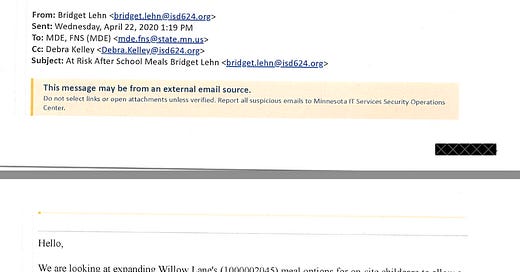The testimony in the first Feeding Our Future trial, particularly regarding allegedly fraudulent meal rosters, is profoundly flawed and introduced unfair prejudice against the defendants. The government's approach relies on questionable comparisons and assumptions that fail to reflect the realities of the pandemic and the emergency food distribution system. Let’s explain why this testimony is not probative of wrongdoing and instead misleads the jury.
Comparing School Rosters to Meal Rosters: A Misguided Metric
One of the government's main arguments centers on comparing meal site rosters to local school attendance records. IRS Special Agent Joshua Parks testified that names on the food site rosters didn’t match students enrolled in nearby schools. But this comparison makes no sense in the context of the pandemic. The meal sites were "open" during COVID-19, meaning families could pick up food from any location, not just the one nearest their home or their child's school. There were no geographical restrictions.
During the pandemic, the United States Department of Agriculture intentionally expanded access to ensure families could get food regardless of where they lived or whether their children attended local schools. So, the fact that names on the rosters don’t match school records is not evidence of fraud—it reflects the nature of the emergency program rules. The government’s comparison is, at best, a misunderstanding of the program’s design and, at worst, an attempt to skew the evidence to appear more incriminating than it actually is.
No Verification Required: Defendants Are Not Responsible for Government's Choices
Another glaring issue in the government’s case is the complete disregard for the lack of verification requirements. The federal government waived identification and verification protocols during the pandemic. This was done to ensure families could quickly and easily access food without the usual barriers. The meal sites weren’t expected to check IDs, confirm addresses, or verify enrollment in local schools.
If the government designed the system to operate without these checks, how can it now hold the defendants responsible for any discrepancies in the rosters? The defendants followed the rules of a system built for speed and efficiency, not administrative perfection. The prosecution essentially tries to impose accountability for errors in a system where the government said verification was unnecessary. This argument falls under its own weight when considering the rules the defendants were working under.
Clerical Errors: Inevitable but Not Criminal
The government's argument that duplicate names or identical rosters point to fraud ignores a simple reality: clerical errors are inevitable, especially in high-pressure situations like the pandemic. These meal programs were rapidly scaled up to meet the massive demand and administrative mistakes—such as reusing rosters or duplicating names—were bound to happen.
It’s important to remember that the people compiling these rosters weren’t investigators—they were managing emergency food programs under unprecedented conditions. The repetition of names or rosters could easily result from overworked staff, not intentional fraud. The government’s interpretation unfairly criminalizes mistakes that, under normal circumstances, would be considered part of the expected chaos during a global health crisis.
Common Names and Family Misreporting: A Reality in Vulnerable Communities
Another crucial factor is the demographic reality of many of these meal recipients. In immigrant communities, names like "Mohamed Mohamed" or "Ilhan Omar" are incredibly common. Duplicates or similarities in names are to be expected, especially when no verification is required. The government’s focus on duplicate names ignores this fact and unfairly assumes bad faith where there could easily be legitimate, innocent reasons for these overlaps.
Additionally, many families picking up food were in vulnerable situations—dealing with unemployment, food insecurity, and language barriers. It’s likely that, in some cases, the adults collecting meals may not have provided accurate information, either because of confusion or a desire to avoid bureaucratic hurdles. Again, no verification was required by the government, so holding the defendants accountable for misreporting by vulnerable families is not only unfair but entirely unsupported by the system’s own rules.
These Rosters Weren’t Even Submitted to the State
Perhaps the most striking issue is that the rosters under scrutiny weren’t even provided to the Minnesota Department of Education unless specifically requested. Meal rosters weren’t regularly submitted to the state during the normal course of operations. So, the government’s focus on these rosters as the foundation for its case is puzzling, especially when the overseeing agencies didn’t require them for review in real-time.
Why is this data being used retroactively to accuse the defendants of fraud when the state didn’t deem it necessary to monitor them? This selective scrutiny introduces bias and unfairly targets the defendants based on standards not in place during the pandemic.
Sponsors Were Monitoring and Disallowing Duplicate Meals
Finally, and perhaps most importantly, the sponsors running these meal sites actively monitored for duplicate entries. In one case, a sponsor identified children listed on multiple rosters and informed site operators that meals for those children would be disallowed if duplicates occurred. This means that any duplicate names were flagged and removed from claims submitted to the government. Meals for duplicate children were not claimed, further disproving the prosecution's narrative of systemic fraud.
This crucial point shows that safeguards were in place and functioning, with sponsors taking steps to correct potential errors. The system worked as intended, with checks to prevent duplicates from inflating meal counts. The defendants followed these procedures, and any claims of widespread fraud ignore the evidence that duplicates were being managed and disallowed.
Conclusion: Prejudice Without Proof
The testimony is not only flawed but introduces serious prejudice against the defendants without providing proof of actual wrongdoing. Here’s why:
1. Irrelevant roster comparisons: Comparing open-site meal rosters to local school attendance records is misleading, as families could pick up meals from anywhere.
2. No verification required: The government waived verification rules, so defendants can’t be held responsible for alleged discrepancies in the data.
3. Clerical errors: In a crisis, administrative mistakes are inevitable. The repetition of names or rosters does not prove intent to defraud.
4. Common names and family misreporting: Duplicate names are likely in immigrant communities, and vulnerable families may not have accurately reported information during food pickup.
5. Rosters weren’t required by the state: The government’s sudden focus on these rosters is unwarranted, as the state did not request or monitor them during the pandemic.
6. Sponsors monitored for duplicates: Sponsors were actively disallowing meals for duplicate names, ensuring fraudulent claims were not made.
Why Is the Government Relying on Flawed Analyses?
One has to ask: why is the government leaning so heavily on flawed testimony and irrelevant comparisons? It’s possible that the government’s case lacks stronger, more concrete evidence of actual fraud, and they are now turning to these questionable analyses to paint a more incriminating picture. By focusing on easily misunderstood data—such as comparing meal site rosters to school attendance records—they can create the appearance of misconduct without proving criminal intent. This strategy suggests that the prosecution may be compensating for weaknesses elsewhere in their case. When the real issues—such as relaxed verification rules, inevitable clerical errors, and common names in immigrant communities—are brought to light, it becomes clear that the government’s reliance on these arguments is more about filling gaps than presenting solid evidence of wrongdoing. The testimony should be carefully scrutinized, as it ultimately seems designed to prejudice the jury rather than prove fraud beyond a reasonable doubt.








